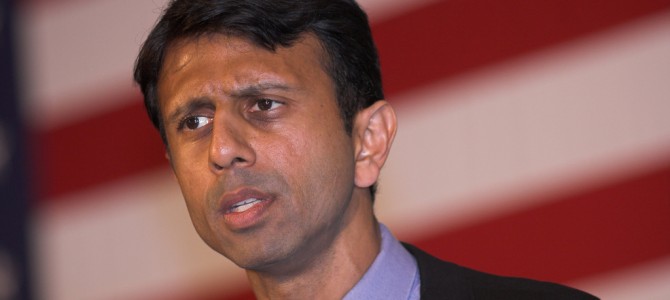
Make no mistake: Bobby Jindal is far and away the best choice to replace Tom Price as secretary of Health and Human Services. Dan McLaughlin at NRO and Steve Berman at The Resurgent both made the case earlier this week for why President Trump would be wise to pick Jindal, whose health-care policy chops and general seriousness about good governance are undisputed.
Berman notes that, among all the other candidates floated recently by Axios and Politico, “Jindal is the best qualified person to run HHS, to craft health care policy, to shepherd legislation through Congress, and to speak intelligently on the topic without igniting a firestorm. Put more succinctly, Jindal will not become a bigger story than Trump, and can hand Trump a win.”
McLaughlin agrees that Jindal would be “an excellent choice,” but questions whether this would be a wise choice for Jindal himself, who is for the first time in his professional life enjoying the fruits of the private sector and generally keeping a low profile. What’s more, Jindal isn’t exactly a Trump fan. Recall that the former Louisiana governor was among the first and fiercest critics of Trump during the 2016 election, calling him an “egomaniacal madman” and a “non-serious carnival act,” among other things.
Not that such insults would preclude Trump from considering Jindal for a cabinet post. Two years ago, Rick Perry said Trump’s candidacy was a “cancer on conservatism” and that Trumpism offered nothing but a “toxic mix of demagoguery and mean-spiritedness and nonsense that will lead the Republican Party to perdition if pursued.” Today, Perry is Trump’s energy secretary.
Jindal’s harsh words for Trump during the campaign might even serve him well in a Republican Party split between pro- and anti-Trump factions, although it would come with a price. As McLaughlin notes, “distance from Trump dissolves once you join his Cabinet. Democrats are also looking for a scalp right now and smell blood over health care, so there’s no guarantee that whoever Trump sends up to the Hill first could even get confirmed. And as a matter of political reality, whatever gets done on health care over the next few years is likely to be far removed from Jindal’s own preferences and proposals.”
Under Obamacare, HHS Has Vast Discretion
That said, there’s much that a competent and driven HHS chief could do to roll back, or at least ameliorate, the parts of Obamacare that have made health insurance so expensive for so many Americans. Price came into the Trump administration promising to comb through the law and use the vast powers accorded to the HHS secretary to do just that. But mostly he did nothing.
Jindal would likely get down to business—and there’s a lot he could do as head of HHS. For example, Obamacare requires that all health plans sold on the individual market cover certain “essential health benefits,” things like hospitalization and ambulatory patient services, but leaves it up to the HHS secretary to define those benefits. For example, one essential health benefit category is “rehabilitative and habilitative services and devices.” Does that include expensive behavioral therapy for autism? As written, Obamacare allows HHS to determine that. Loading up health plans with expensive benefits, of course, drives up premiums. In theory, a Secretary Jindal could define those benefits down to actual essentials, thereby increasing the diversity of plans offered on the individual market.
The best part is, this wouldn’t require any congressional action. It could be accomplished by administrative fiat, which is how Obamacare was designed to function—its framers just assumed a Democratic administration would be implementing the law in perpetuity. Jindal, a health policy wonk of the first order, gets all of this and would make full use that administrative power to curb the law’s excesses.
Here it’s worth noting that Jindal’s health-care policy bona fides can’t be overstated. Anyone who’s interviewed him or been present for an open-ended Q&A knows that he can expound at length on, say, the problem of counting hospital uncompensated care as a reimbursable Medicaid expense. Or the ways that federal Medicaid matching funds incentivize states to spend more than they need to. Or any number of arcane aspects of health policy that were obviously beyond the scope of Price, who mostly just repeated wooden talking points during recent congressional efforts to pass health-care reform.
After all, Jindal had among the most detailed and realistic plans to repeal and replace Obamacare, which he unveiled back in 2014. If anyone could push Congress toward the policies that would have the most effect, and might actually get past a divided GOP Congress, it would be him.
Obama and the Democrats made a huge mistake when they crafted health-care legislation that relied on progressive bureaucrats to faithfully implement it. They certainly never imagined that an administration headed by Trump would be in charge of the vast administrative apparatus charged with more or less making up the law as it goes along.
If the Republican-controlled Congress can’t agree on an Obamacare repeal and replacement, a competent and conservative bureaucrat like Jindal might be the closest thing to repeal that Trump is going to get.









